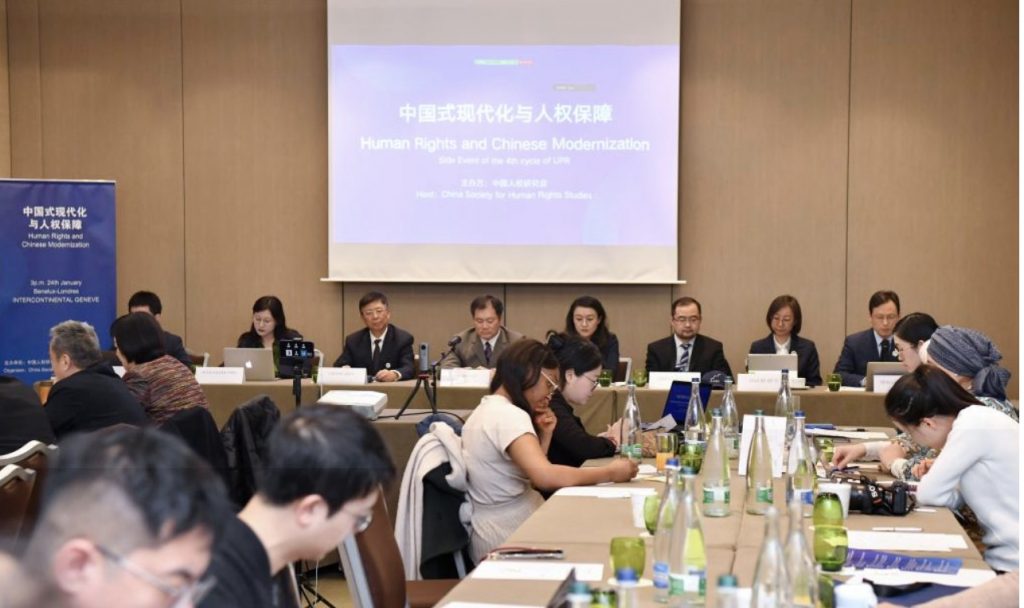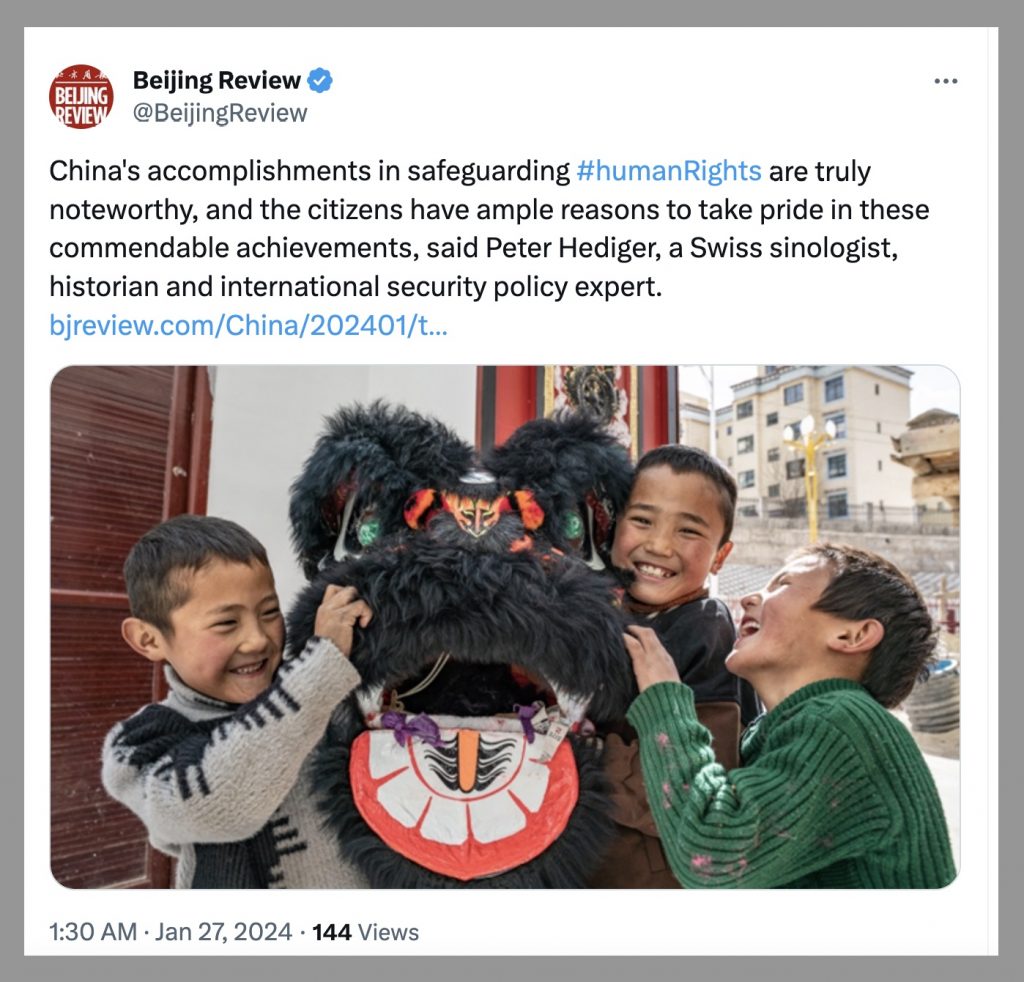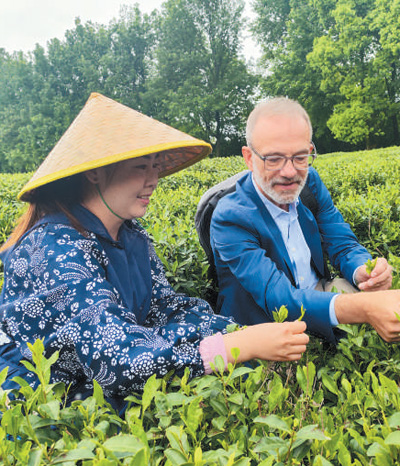
As an examination of China’s human rights record kicked off under the United Nations’ Universal Periodic Review (UPR) mechanism in Geneva last month, a number of sideline events hosted by ostensibly independent organizations offered a brighter alternative to the dismal facts on China reported by international human rights groups, which cited among their criticisms crimes against humanity in Xinjiang and the deterioration of rights and protections in Hong Kong.
Held on January 24 at the five-star InterContinental Geneva, one event was called “Chinese-Style Modernization and Human Rights Protection,” a nod to one of Chinese leader Xi Jinping’s latest political concepts. The forum reportedly gathered together Uyghur and Tibetan scholars, as well as “many professionals and scholars in human rights related fields.”
A Swiss participant in the forum was quoted by the official Xinhua News Agency as saying that the “achievements” in China’s report to the UN had left a deep impression, and that “the people of China should feel proud.” The event was hosted by the China Society for Human Rights Studies (CSHRS), which according to its official website is a non-governmental organization and “China’s largest academic group on human rights.”

In fact, these and other “sideline meetings,” or bianhui (边会), offer a glimpse into the mechanics of how China seeks to manipulate the global human rights system, promoting a self-serving alternative view of human rights that critics have called rights-free development. At the same time, they reveal how China is able to leverage the UN to support the narratives promoted in international reporting by the country’s state-run media.
Far from offering real expert alternatives on the question of human rights, groups like CSHRS are a part of a network linked to the Chinese party-state whose primary purpose is to distract attention away from China-related criticism, to the detriment of human rights everywhere.
CoNGO Con Job
On its official “About Us” page, the China Society of Human Rights Studies emphasizes its status as “a non-governmental organization with special consultative status with the United Nations Economic and Social Council (ECOSOC) and a member of the United Nations Conference of Non-Governmental Organizations (CONGO).” Formed in 1948, the same year the Universal Declaration of Human Rights (UDHR) was created, CoNGO is an independent international membership association meant to promote the involvement of non-governmental organizations from around the world in the UN system, and to “draw civil society into an enduring partnership with the world body.”
Including civil society in the rights-related work of the UN was crucial from the start because states, while they may make national commitments to the principles set out in the UDHR, cannot be depended upon to provide transparency and accountability. Speaking at CoNGO’s 75th anniversary celebrations in December last year, Sophie Torelli-Chironi, head of the UN’s NGO liaison unit, emphasized that the purpose of the association, key to the protection of human rights globally, was “to reinforce the participation of civil society in multilateral processes in Geneva.”
The China Society of Human Rights Studies (CSHRS) began participating in the human rights mechanisms at the UN in the 1990s, ostensibly as a representative of Chinese civil society. The group was formed in March 1993, just three months before the World Conference on Human Rights took place in Vienna, making the first concrete recommendations for strengthening human rights protection through the UN. As these processes took shape in the 1990s, China already emphasized its relativistic approach, arguing that “countries naturally differed in their emphasis in the promotion and protection of human rights.”
Since the 1990s, CSHRS has played a key role in promoting China’s relativistic approach within the UN, and the organization seems to have been expressly created by the Chinese party-state with this purpose in mind. According to the “About Us” section of the CSHRS website, the organization is primarily funded by the China Human Rights Foundation (中国人权发展基金会), which is directly operated by the CCP’s Central Propaganda Department, and by the Information Office of the China’s State Council. Under China’s party-state system, these two are actually the same office.
In other words, while the China Society of Human Rights Studies claims to be a non-governmental organization, it is run directly by the CCP and the Chinese government. More to the point, in fact, it is run by the office within China’s government primarily responsible for its external propaganda to the world.
Another of China’s “non-governmental” organizations active at the UN is the China NGO Network for International Exchanges (中国民间组织国际交流促进会), or CNIE, which held a sideline event in Geneva on January 22, the day before China’s UPR, called “Putting Development at the Center of the Agenda: safeguarding Economic, Social and Cultural Rights.”
Since the 1990s, CSHRS has played a key role in promoting China’s relativistic approach within the UN.
Consistent with the relativistic view of human rights China has promoted since the 1990s, the CNIE event placed its emphasis on the “right to development” (发展权) over the civil and political rights set out in the Universal Declaration of Human Rights, and focused on economic, social and cultural rights as the sole object of human rights protection.
Who is CNIE?
Founded in 2005, the group describes itself variously as a “non-profit social organization” and a “consortium of civil society organizations” (民间组织联合体). But it is directly operated by the International Liaison Department of the Chinese Communist Party, the agency under the Central Committee tasked with maintaining close relations with foreign organizations and political parties — and now one of the most active means for the party-state to exert influence, often covertly, around the world.
Telling China’s Story Inside the UN
By hosting these and other events through NGO front organizations on the sidelines of the UPR — as well as on a regular basis — China amplifies its official talking points on human rights through what might seem to some a legitimate part of the UN consultative process with civil society. It seeks to legitimize state-aligned experts as independent voices, while amplifying the voices of foreign participants to counteract fact-based human rights concerns.

The CSHRS event in Geneva drove a wave of virtually identical foreign-language reports in state media, most focusing on the remarks of Peter Hediger, identified as “a Swiss sinologist, historian and international security policy expert.” Hediger’s credentials as a sinologist are unclear, but he has been identified in Chinese state media and elsewhere as “a former senior analyst for defense and security policy in the Swiss Ministry of Defense.” While Hediger has made several appearances in Chinese state media since 2022, cited in support of China’s views on topics from human rights to international security (including at a human rights forum in Beijing last year), he has rarely appeared in other public forums — outside of a lecture one year ago on Chinese security policy to a group at the Swiss-Chinese Association (瑞中协会).
The report from the official Xinhua News Agency on the CSHRS event in Geneva, “Global Experts Applaud China’s Achievements in Human Rights Protection,” was promoted through the agency’s YouTube channel, and was shared by many other official outlets, including the government-run news portal China.org.cn, and the Beijing Review (which also promoted the story through Twitter). The report was re-run by overseas outlets with close connections to the Chinese government, including the Rwanda-based news website China-Africa Review.
The English-language website of the Global Times, an outlet published by the CCP’s flagship People’s Daily newspaper, ran its own report on the CSHRS side event, quoting Xinjiang professor Remina Xiaokaiti as saying that “human rights in Xinjiang have made tremendous progress in the cause of Chinese modernization,” and that “Xinjiang has made unrelenting efforts to safeguard social equity and to promote the holistic growth of individuals.”
How’s that for relativity?
Another source quoted by the outlet was Xiao Wu, a professor at the Human Rights Research Institute of China’s Southwest University of Political Science and Law. Founded in 2011 to “actively serve the government’s human rights strategy,” the institute is operated under the supervision of the propaganda department of the provincial-level Chongqing municipality and has close links with CSHRS and its Central Propaganda Department-backed funder, the China Human Rights Foundation.
While reports on the CSHRS event in Geneva did not seem to catch on internationally outside of a handful of Chinese state media, they received blanket exposure inside China, appearing on hundreds of websites.
A State-First Model of Human Rights
But these sideline events likely have a longer-term impact in gathering support for China’s position on rights-free development globally, and in normalizing its alternate human rights discourse, particularly among Global South states.
Among the participants in the forum hosted on January 22, the day before China’s UPR, by the CCP-run China NGO Network for International Exchanges (CNIE) was Haydar Ali Ahmad, Syria’s ambassador to the United Nations Office in Geneva. Ali Ahmad was not just quoted by the government-run China Daily, Xinhua and others, voicing his support at the meeting for China’s “remarkable achievements in the field of human rights,” but employing terms specific to China’s alternate discourse on human rights — including “people-centered” (以人民为中心) decision making.
While the “people-centered” principle may sound superficially appealing, suggesting the agency of citizens, it actually means the opposite, and tacitly supports China’s assertion that nation states — not individual citizens or civil society — must play a primary role in determining human rights standards. Within the political discourse of the CCP, “people-centered” is explicitly subordinated to the principle that “the Party governs all” (党领导一切).
This position on the primacy of the state over individual rights runs entirely counter to the original spirit of civil society inclusion in the rights-related work of the United Nations through independent mechanisms like CoNGO.
As China’s UPR was held the day after the CNIE event, Haydar Ali Ahmad was the Syrian representative speaking at the UN in defense of China’s human rights record, saying, “We commend China’s commitments to the cause of human rights globally, and its initiatives to promote constructive dialogue.” Consistent with China’s focus purely on social, economic and cultural rights, Ali Ahmad focused his remarks on China’s efforts to improve living standards, employment and housing (2:32).
These sideline events likely have a longer-term impact in gathering support for China’s position on rights-free development globally.
In fact, China’s alternate vision of human rights as rights-free development guaranteed through the economic acts of the state was echoed by the vast majority of countries making their submissions to the UPR on January 23 — in ways that suggest they have directly adopted China’s official language about “putting development at the center of the agenda.”
Iran’s delegate said that his country “appreciates the economic plans implemented by the government of China with the aim of supporting social, economic and cultural rights in China” (1:14). Nepal’s delegate said that his country “commends China for the socio-economic progress achieved particularly in the reduction of poverty with positive impact on the broader realization of human rights” (1:42). Lebanon praised China’s progress since the last UPR, “especially as regards socio-economic rights” (1:25). Liberia too “[commended] the steps taken by China since the last cycle, particularly towards economic and social development” (1:27).
While it is legitimate to promote economic, social, and cultural rights, the issue is the exclusion of the civil and political rights also set out clearly in the UDHR. For more on China’s alternative vision of human rights, see the related entry by Malin Oud in the Decoding China dictionary.
Setting his country apart in the brazen adoption of China’s human rights discourse, the delegate from Mali remarked that he “[commended] China’s efforts which led to its achieving the first goal of the century within the set timeline, which was building a moderately prosperous society in all areas as foreseen by the 2030 sustainable development program” (1:32).
This is conspicuous CCP-speak, corresponding directly to the political goals of Xi Jinping, and it can only have been supplied directly by China.

Disempowering Societies
China’s messaging on human rights has been pushed and cultivated consistently and relentlessly, and its “non-governmental” front organizations, including CNIE and the China Society for Human Rights Studies, have played a critical role in this process.
Consider that in June last year, as submissions for China’s UPR were in progress, an in-country tour was planned for 16 international NGOs from Brazil, Pakistan and Tunisia, as well as journalists, who were to witness the country’s human rights achievements first-hand. They visited tea plantations in Zhejiang, and assembled paper lanterns in Chongqing (where they met with the aforementioned Human Rights Research Institute, the academic center with Chongqing propaganda office backing). The tour was arranged by CNIE, directly paid for by the CCP’s International Liaison Department. Nevertheless, the official People’s Daily called it a “civil society mission.”
One of the many events hosted last year by CSHRS was the China-Europe Seminar on Human Rights (中欧人权研讨会), held in Rome in September, which drew participation from scholars and government representatives from across Europe. The event’s co-sponsor was the law department at Sapienza University of Rome. According to a report posted to China Human Rights Online (humanrights.cn), the official website of CSHRS, the event aimed to “dispel misunderstanding” about human rights in China, and advocate for “diversity” in the understanding of human rights concepts. The report quoted Neil Davidson, a member of the UK House of Lords (and a frequently quoted source in China’s state media), as urging against efforts to “weaponize” the human rights debate.
A little-known fact about the humanrights.cn website is that it is operated by the China Intercontinental Communication Center (CICC), which like the China Human Rights Foundation is directly under the CCP’s Central Propaganda Department and State Council Information Office.
Since the 1993 World Conference on Human Rights, China has consistently promoted the idea that efforts to press for accountability on human rights are “arrogant,” “biased” and “politicized.” The focus in assessments, it says, should shift instead to broad social, economic and cultural measures as endorsed by states. The basic and fatal flaw in such an approach is that it disempowers individuals and communities, systematically erasing their voices in the global process of human rights development.
Once exposed, the disingenuous activities of front organizations like CNIE and CSHRS make clear it is China playing politics with human rights. Its organizations, indistinguishable from the regime, undermine the integrity of the very UN system put in place to ensure the robust participation of civil society — even as they promote a self-serving vision of human rights in which civil society organizations have no real place or power.

David Bandurski




















